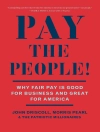Title VIII of the Civil Rights Act of 1968, known as the Fair Housing Act, prohibited discrimination in the sale, rent, and financing of housing based on race, religion, and national origin. However, manifold historical and contemporary forces, driven by both governmental and private actors, have segregated these protected classes by denying them access to homeownership or housing options in high-performing neighborhoods. Perspectives on Fair Housing argues that meaningful government intervention continues to be required in order to achieve a housing market in which a person’s background does not arbitrarily restrict access.
The essays in this volume address how residential segregation did not emerge naturally from minority preference but rather how it was forced through legal, economic, social, and even violent measures. Contributors examine racial land use and zoning practices in the early 1900s in cities like Atlanta, Richmond, and Baltimore; the exclusionary effects of single-family zoning and its entanglement with racially motivated barriers to obtaining credit; and the continuing impact of mid-century ’redlining’ policies and practices on public and private investment levels in neighborhoods across American cities today. Perspectives on Fair Housing demonstrates that discrimination in the housing market results in unequal minority households that, in aggregate, diminish economic prosperity across the country.
Amended several times to expand the protected classes to include gender, families with children, and people with disabilities, the FHA’s power relies entirely on its consistent enforcement and on programs that further its goals. Perspectives on Fair Housing provides historical, sociological, economic, and legal perspectives on the critical and continuing problem of housing discrimination and offers a review of the tools that, if appropriately supported, can promote racial and economic equity in America.
Contributors : Francesca Russello Ammon, Raphael Bostic, Devin Michelle Bunten, Camille Zubrinsky Charles, Nestor M. Davidson, Amy Hillier, Marc H. Morial, Eduardo M. Peñalver, Wendell E. Pritchett, Rand Quinn, Vincent J. Reina, Akira Drake Rodriguez, Justin P. Steil, Susan M. Wachter.
Innehållsförteckning
Foreword
Marc H. Morial
Introduction
Vincent J. Reina, Wendell E. Pritchett, and Susan M. Wachter
Chapter 1. The Long History of Unfair Housing
Francesca Russello Ammon and Wendell E. Pritchett
Chapter 2. Sociology, Segregation, and the Fair Housing Act
Justin P. Steil and Camille Z. Charles
Chapter 3. Parallel Pathways of Reform: Fair Public Schooling and Housing for Black Citizens Akira Drake Rodriguez and Rand Quinn
Chapter 4. The Economic Importance of Fair Housing
Vincent J. Reina and Raphael Bostic
Chapter 5. The Fair Housing Act’s Original Sin: Administrative Discretion and the Persistence of Segregation
Nestor M. Davidson and Eduardo M. Peñalver
Chapter 6. A Queer and Intersectional Approach to Fair Housing
Amy Hillier and Devin Michelle Bunten
List of Contributors
Index
Om författaren
Vincent J. Reina is Assistant Professor in the Department of City and Regional Planning at the University of Pennsylvania and the Faculty Director of the Housing Initiative at Penn. Wendell E. Pritchett is Provost and James S. Riepe Presidential Professor of Law and Education at the University of Pennsylvania. Susan M. Wachter is the Albert Sussman Professor of Real Estate and Professor of Finance, The Wharton School; and Co-Director, Penn Institute for Urban Research, at the University of Pennsylvania. Marc Morial is president of the National Urban League and served as mayor of New Orleans from 1994 to 2002.












